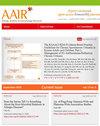血清Zonulin是重度哮喘的生物标志物。
IF 4.3
2区 医学
Q2 ALLERGY
引用次数: 1
摘要
Zonulin是上皮和内皮屏障功能的调节剂。它通过破坏紧密连接来调节肠道通透性。上皮屏障功能缺陷是哮喘气道炎症的标志。本研究旨在探讨zonulin在重症哮喘发病机制中的作用。我们招募了56名成年哮喘患者(29名重度哮喘患者和27名轻中度哮喘患者)和33名正常对照。患者的临床资料、血清和肺组织由韩国成人哮喘现实和进化队列(COREA)和韩国顺春香大学富川医院生物银行提供。使用酶联免疫吸附法估计血清中zonulin的水平,并通过免疫组织化学染色评估支气管组织中zonulin的表达。重度哮喘患者血清zonulin水平(51.98±19.66 ng/mL)明显高于轻中度哮喘和正常对照组(26.35±13.70 vs. 17.26±10.29 ng/mL, P < 0.001)。它们与预测一秒钟用力呼气量的百分比(%FEV1)显著相关(r = -0.35, P = 0.009)。支气管上皮zonulin的表达在严重哮喘患者中较高。区分重度和轻中度哮喘患者的血清带蛋白临界值为38.83 ng/mL。Zonulin可能在严重哮喘的发病机制中发挥重要作用,血清Zonulin可能是严重哮喘的潜在生物标志物。本文章由计算机程序翻译,如有差异,请以英文原文为准。



Serum Zonulin Is a Biomarker for Severe Asthma.
Zonulin is a regulator of epithelial and endothelial barrier function. It regulates intestinal permeability through disrupting tight junctions. Defective epithelial barrier function is a hallmark of airway inflammation in asthma. This study aimed to investigate the role of zonulin in the pathogenesis of severe asthma. We enrolled 56 adult patients with asthma (29 severe asthma and 27 mild-to-moderate asthma) and 33 normal controls. The clinical data, sera, and lung tissues of the patients were provided by the Cohort for Reality and Evolution of adult Asthma in Korea (COREA) and the Biobank of Soonchunhyang University Bucheon Hospital, South Korea. Serum zonulin levels were estimated using an enzyme-linked immunosorbent assay, and zonulin expression in the bronchial tissue was evaluated by immunohistochemical staining. The serum zonulin levels were significantly higher in patients with severe asthma (51.98 ± 19.66 ng/mL) than in those with mild-to-moderate asthma and normal controls (26.35 ± 13.70 vs. 17.26 ± 10.29 ng/mL, P < 0.001). They significantly correlated with percent predicted forced expiratory volume in one second (%FEV1) (r = −0.35, P = 0.009). The zonulin expression in the bronchial epithelium was greater in patients with severe asthma. A serum zonulin cutoff value to distinguish between severe and mild-to-moderate asthmatics was 38.83 ng/mL. Zonulin may play an important role in the pathogenesis of severe asthma, and serum zonulin could be a potential biomarker for severe asthma.
求助全文
通过发布文献求助,成功后即可免费获取论文全文。
去求助
来源期刊

Allergy, Asthma & Immunology Research
ALLERGY-IMMUNOLOGY
CiteScore
6.10
自引率
6.80%
发文量
53
审稿时长
>12 weeks
期刊介绍:
The journal features cutting-edge original research, brief communications, and state-of-the-art reviews in the specialties of allergy, asthma, and immunology, including clinical and experimental studies and instructive case reports. Contemporary reviews summarize information on topics for researchers and physicians in the fields of allergy and immunology. As of January 2017, AAIR do not accept case reports. However, if it is a clinically important case, authors can submit it in the form of letter to the Editor. Editorials and letters to the Editor explore controversial issues and encourage further discussion among physicians dealing with allergy, immunology, pediatric respirology, and related medical fields. AAIR also features topics in practice and management and recent advances in equipment and techniques for clinicians concerned with clinical manifestations of allergies and pediatric respiratory diseases.
 求助内容:
求助内容: 应助结果提醒方式:
应助结果提醒方式:


